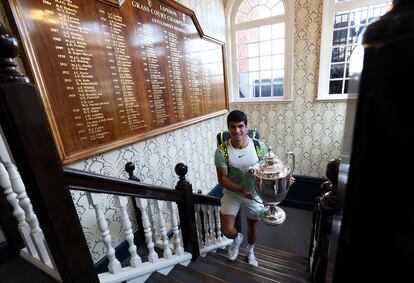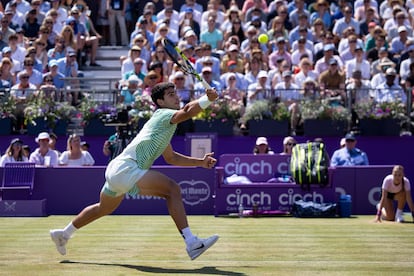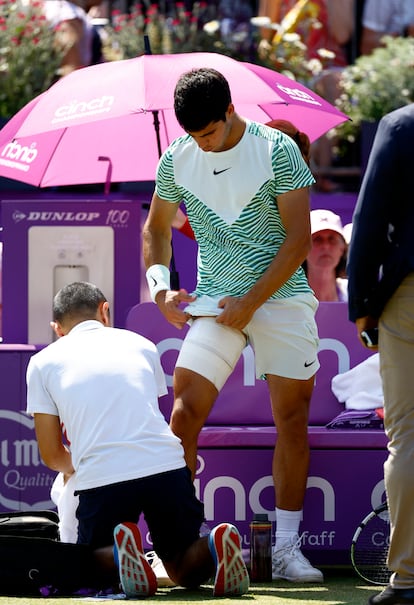Carlos Alcaraz sets his sights on Wimbledon
After an impressive triumph on grass, the world’s top tennis player aims for the UK’s prestigious tournament

At the age of 20, Carlos Alcaraz sometimes struggles to temper the impetuosity of youth, straining against the irrepressible energy that drives him. Prudence tells him to lower the revs, but instinct takes over. One day he says things like, “My expectations for this tournament aren’t high, I lack the experience.” That was on the first day of the Queen’s Cup grass court tournament this year. The next day, he changed his tune. “Yes, I think I can and want to win here,” he said after winning his second match. The young Spaniard, who had only played 11 matches on this surface before facing grass specialist Alex de Minaur of Australia in the final, handily beat him in 99 minutes. Wimbledon, here comes Alcaraz.
“I think I’m one of the favorites to win Wimbledon. I feel very confident and if I go there without too many expectations, I can win it. Honestly, I need more experience because I’ve only played 11 matches [three tournaments] on this surface. But with all the weapons I have, I consider myself a good player,” said Alcaraz, who hails from El Palmar, a town on the outskirts of Murcia in southeastern Spain. Alcaraz’s Queen’s Cup victory showcased his ability to quickly adapt to the grass surface, which doesn’t allow any time for acclimation or concessions. Despite all odds, Alcaraz’s exceptional drive and talent makes him one of the key names that could define the next decade of the sport.
Alcaraz is a prodigy even among his precocious peers. His latest victory proves he is an exceptional tennis player who is resolute in his ambition to be one of the greatest of all time. Alcatraz is the youngest player to be ranked number one (in singles) in the world. Now he has added another feather to his cap by claiming titles on all three surfaces – hard court, clay, and grass – faster than tennis legends Federer, Nadal, and Djokovic. Roger Federer accomplished the feat at 21 years and 10 months, and Nadal at 22. Djokovic, who was just dethroned as the world’s top-ranked player with Alcaraz’s latest win, didn’t do it until he was two months past his 24th birthday.

“It’s amazing,” he told a reporter from the EFE news agency. “I know it’s harder [to win on grass] because grass is different – much faster. But I’ll give myself some credit. I’m very happy to be playing so well on this surface so quickly.” Four years ago, Alcaraz faced the legendary Federer at the All England Tennis Club, who told him, “Be patient, keep up the enthusiasm and all your dreams will come true.” The dream is clear and present – Wimbledon.
In just one week, everything changed
Up until recently, it seemed as if Djokovic would be unbeatable at “The Cathedral,” the All England Lawn Tennis and Croquet Club (also known as the All England Club) based at Wimbledon in London. But Alcaraz’s remarkable performance at the Queen’s Cup has shifted the landscape in a major way. The Serbian is a seven-time Wimbledon champion and has 23 major titles to his name. No one doubts Novak Djokovic is a top contender for the crown, but it’s clear that Alcaraz has narrowed the substantial gap between the two. With his performance last week, we can expect an exhilarating battle ahead.

Acaraz has already earned a place among other Spanish winners of the Queen’s Cup: Andrés Gimeno (1960); Rafael Nadal (2008); and Feliciano López (2019 and 2017). But Alcaraz is the youngest male singles champion since Australian Lleyton Hewitt took the crown 23 years ago when he was just 19. Alcaraz and Daniil Medvedev (Russia) are tied for the most titles this season with five, followed by Djokovic with three. The Serbian is hard at work preparing for Wimbledon and is watching Alcaraz’s latest performance with trepidation – the youngster is clearly a force to be reckoned with.
“I saw a stat that Novak has won more matches [86, with only 10 losses] than the other top 20 competitors combined,” said Alcaraz. “He’s the big favorite. I have to be at my best to have a chance. I’m very happy to win [the Queen’s Cup], but I’m more pleased to know I’m playing at a high level with a lot of confidence.”
THE BEST “ALL-TERRAIN VEHICLE” SINCE 1983
With his Queen’s Cup victory, Alcaraz joined the elite group of Spanish tennis pros who have won at least one grass court title in the Open Era (since 1968). There are 10 in all: Santana, Gimeno, Nadal, Ferrer, Feliciano, Bautista, Arantxa, Conchita, Muguruza, and now Alcaraz. He is also the youngest player to win on clay, grass and hard courts in the same season since Sweden's Mats Wilander achieved this feat in 1983, according to the Association of Tennis Professionals. That was also the year the tennis world saw seven changes in the number one ranking. This season has had six lead changes so far: Djokovic has held the top ranking three times and Alcaraz three times. That’s where he is now until Wimbledon is over, and where he’ll remain if he wins.
Right now, only 80 points separate the two players: 7,675 for Alcaraz versus 7,595 for Djokovic. No other player has held the number one ranking this year, and the last person not named Alcaraz or Djokovic to hold the top ranking was Russia’s Daniil Medvedev, for 13 weeks between June and September 2022.
Alcaraz has also won tournaments this year in Buenos Aires, Indian Wells (California), Barcelona and Madrid. Whether he participates in the Hurlingham Tennis Classic, a pre-Wimbledon exhibition, depends on the sore adductor muscle in his right leg he has been pampering.
"It was just a precaution," said Alcaraz, referring to treatment to his leg after winning the first set of the Queen’s Cup title match. “Tennis players often have to play through discomfort and pain. They treated me so it wouldn’t get worse, and now we’re going ahead with our plan."
Tu suscripción se está usando en otro dispositivo
¿Quieres añadir otro usuario a tu suscripción?
Si continúas leyendo en este dispositivo, no se podrá leer en el otro.
FlechaTu suscripción se está usando en otro dispositivo y solo puedes acceder a EL PAÍS desde un dispositivo a la vez.
Si quieres compartir tu cuenta, cambia tu suscripción a la modalidad Premium, así podrás añadir otro usuario. Cada uno accederá con su propia cuenta de email, lo que os permitirá personalizar vuestra experiencia en EL PAÍS.
¿Tienes una suscripción de empresa? Accede aquí para contratar más cuentas.
En el caso de no saber quién está usando tu cuenta, te recomendamos cambiar tu contraseña aquí.
Si decides continuar compartiendo tu cuenta, este mensaje se mostrará en tu dispositivo y en el de la otra persona que está usando tu cuenta de forma indefinida, afectando a tu experiencia de lectura. Puedes consultar aquí los términos y condiciones de la suscripción digital.









































